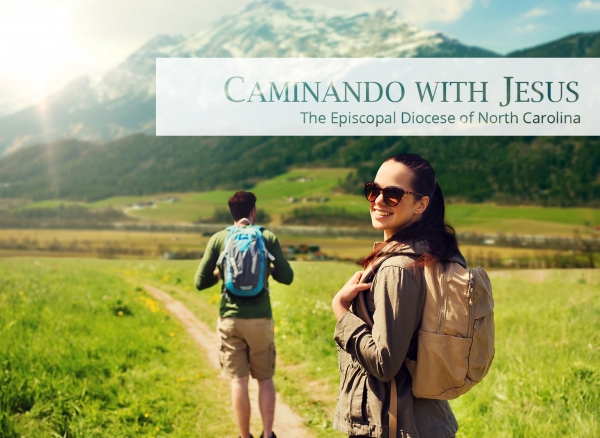CAMINANDO WITH JESUS: In the Place of Certainty, Hope

Jesus made the disciples get into the boat and go on ahead to the other side, while he dismissed the crowds. And after he had dismissed the crowds, he went up the mountain by himself to pray. When evening came, he was there alone, but by this time the boat, battered by the waves, was far from the land, for the wind was against them. And early in the morning he came walking toward them on the sea. But when the disciples saw him walking on the sea, they were terrified, saying, “It is a ghost!” And they cried out in fear. But immediately Jesus spoke to them and said, “Take heart, it is I; do not be afraid.”
Peter answered him, “Lord, if it is you, command me to come to you on the water.” He said, “Come.” So Peter got out of the boat, started walking on the water, and came toward Jesus. But when he noticed the strong wind, he became frightened, and beginning to sink, he cried out, “Lord, save me!” Jesus immediately reached out his hand and caught him, saying to him, “You of little faith, why did you doubt?” When they got into the boat, the wind ceased. And those in the boat worshiped him, saying, “Truly you are the Son of God.”
- Matthew 14:22-33
In Ursula K. Le Guin’s fantasy novel, The Farthest Shore, a young prince by the name of Arren sets off on a sea voyage with Ged, the most powerful wizard of Earthsea. They journey far from home in a last-ditch effort to restore balance to their world, traveling not only to the realm of death, but beyond death itself.
Having grown up with tales of Ged’s daring exploits, Arren is disappointed to find that even he—the wizard he had idolized all his life!—does not have all the answers he seeks. In an introspective moment, Arren makes his frustration plain: “There is a certain bleakness in finding hope where one expected certainty.”
In the place of certainty, hope: I cannot help but think of that phrase when I consider the disciples’ predicament in our gospel passage today. Jesus, after all, is the reason they find themselves in the middle of this storm—he sent them off on the boat while he dismissed the crowds (14:22). As the disciples cower in fear, Jesus makes his way toward them over the stormy sea. Jesus, however, does not still the storm before he bids Peter to come out of the boat. Rather, he calls him forward amid the howling wind and waves—no assurances provided, save the call of the one powerful enough to see him through.
In the face of life’s trials, Jesus often offers us hope, not certainty. That is a tough lesson to learn if ever there was one. There is something comforting about planning ahead and having a good sense of the risks and benefits involved before we take our next step. And yet all the long-term planning in the world will not spare us from the chaotic and unpredictable turns that life has to offer. The unpredictable may take the form of a worldwide pandemic, but it can also be a whole host of other things: it may be an unexpected layoff, a life-threatening diagnosis, a sudden lack of clarity as we attempt to make a life-changing decision. In these moments, we would like the assurance of established answers, clear goals, and measurable outcomes. What Jesus offers instead is the assurance of God’s call upon us—the assurance that God is with us in the thick of uncertainty, as the tempest tosses our little boat to and fro.
“Now faith is the assurance of things hoped for,” the writer of Hebrews states, “the conviction of things not seen” (Heb 11:1). Hope is not mere positive thinking or the ability to see the silver lining in a storm cloud. Hope, rather, is the firm-footed belief that, though the world may be full of chaos, despair and adversity, the long arc of history bends toward justice. Our hope is rooted in the faith that God has already defeated the principalities of this world and the power of death itself.
A great cloud of witnesses already precedes us, that faithful sea of saints and martyrs who hoped when there was little to feel hopeful about and who marched on, not in spite of, but even in the face of, resistance. In the end, the question is not whether God will weather the storm, but rather: Will you get out of the boat?
The Rev. Javier Almendárez-Bautista is the associate rector of St. Paul's, Cary.
Tags: Caminando with Jesus
